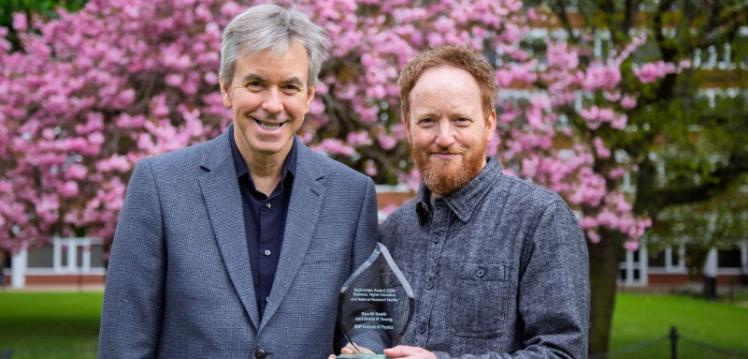
Recognizing Excellence at Queen’s University Belfast: A Closer Look at Pioneering Work in Astrophysics
Queen’s University Belfast continues to demonstrate its leadership in scientific research and innovation. Recently, the university proudly acknowledged the exceptional contributions of its staff members in fields spanning astrophysics research to cutting-edge software engineering. These achievements not only elevate Queen’s reputation but also push the boundaries of our understanding of the universe and our technological capabilities.
High-Level Recognition for Queen’s Staff in Astrophysics and Software Engineering
At the forefront of these accolades are Dr. Ken Smith and Dr. David Young from the Astrophysics Research Centre (ARC) within the School of Mathematics and Physics. Their work in discovering and analyzing cosmic phenomena has garnered the prestigious 2024 Institute of Physics (IOP) Business, Higher Education, and National Research Facility Technician Award. This recognition underscores the crucial role that software engineers play in advancing astrophysical research and generating new cosmic insights.
Their commitment has contributed to landmark discoveries such as the detection of optical signals from gravitational wave sources and the identification of the fastest, brightest supernova in a nearby galaxy. These breakthroughs exemplify how innovative software solutions are integral to modern astronomical investigations.
Queen’s University Belfast and Its Impact on Astrophysics Research
Queen’s University Belfast has solidified its position as a hub for astrophysics and space research, notably through its collaboration with international sky surveys and observatories. The university’s dedicated teams design complex data systems that handle vast amounts of cosmic data, enabling scientists worldwide to make significant discoveries. For instance, Dr. Smith’s development of databases managing billions of detections has been pivotal in facilitating rapid analysis of celestial events.
Similarly, Dr. Young’s creation of software for source classification and observation scheduling exemplifies how technological innovation accelerates scientific progress. These tools allow researchers to respond swiftly to transient events in space, dramatically increasing the potential for new discoveries.
The Role of Software Engineering in Modern Astrophysics
The recognition of Drs. Smith and Young highlights a broader trend in scientific research: the indispensable role of software engineering. As telescopes and sky surveys generate unprecedented volumes of data, sophisticated software infrastructure becomes essential. Software engineers like Dr. Smith and Dr. Young serve as the bridge between raw data and meaningful scientific insight, ensuring that complex analyses are feasible and efficient.
Their work exemplifies how dedicated technical expertise supports scientific teams in unravelling the universe’s mysteries—from cosmic explosions to black hole interactions. The award also emphasizes the importance of interdisciplinary collaboration, where software development and astrophysics work hand-in-hand to achieve groundbreaking results.
Opportunities for Aspiring Researchers in Space Science and Software Development
Queen’s University Belfast offers rich opportunities for students and early-career researchers eager to explore astrophysics, space science, and related software engineering fields. Graduate programs equipped with state-of-the-art facilities prepare individuals to contribute meaningfully to ongoing cosmic discoveries and technological innovations.
By studying at Queen’s, aspiring scientists can engage with experts leading international projects and develop vital skills in data analysis, software development, and observational astronomy. The university’s emphasis on research impact ensures that students and staff alike are contributing to society’s understanding of our universe.
How Queen’s Supports Innovation and Excellence in Scientific Research
Queen’s University Belfast fosters a research environment that values innovation, collaboration, and practical impact. Its strategic focus on areas like astrophysics research ensures ongoing support for groundbreaking work. Initiatives such as the Postdoctoral Development Centre and research strategy guides help staff and students develop their careers while contributing to global scientific advancements.
Additionally, partnerships with industry and international research organizations enable the university to stay at the cutting edge of space science technology, providing ample opportunities for impactful research projects and professional development.
Get Involved and Learn More
If you’re interested in exploring space science or software engineering, Queen’s University Belfast offers various pathways to get involved. Whether as a prospective student, researcher, or industry partner, the university’s diverse programs and collaborative initiatives open doors to contributing to cosmic discoveries and technological progress.
For further information on programs related to astrophysics, space research, or software development, consider visiting the university’s research pages or contacting their admissions office directly. Discover how you can participate in or support advancements that expand our understanding of the universe.
Conclusion: Recognizing Contributions that Propel Scientific Discovery
The achievements of Dr. Ken Smith and Dr. David Young exemplify the profound impact that dedicated staff and innovative software solutions have on astrophysics research. Their recognition by the Institute of Physics underscores Queen’s University Belfast’s role as a leader in space science and technological innovation. As the university continues to support and develop its talent, it paves the way for future discoveries that may reshape our understanding of the cosmos. Interested individuals and organizations are encouraged to connect with Queen’s to explore opportunities in this exciting realm of science.
Ready to take the next step in your scientific journey? Explore our programs and research opportunities at Queen’s University Belfast and become part of a community dedicated to advancing knowledge and discovery.

